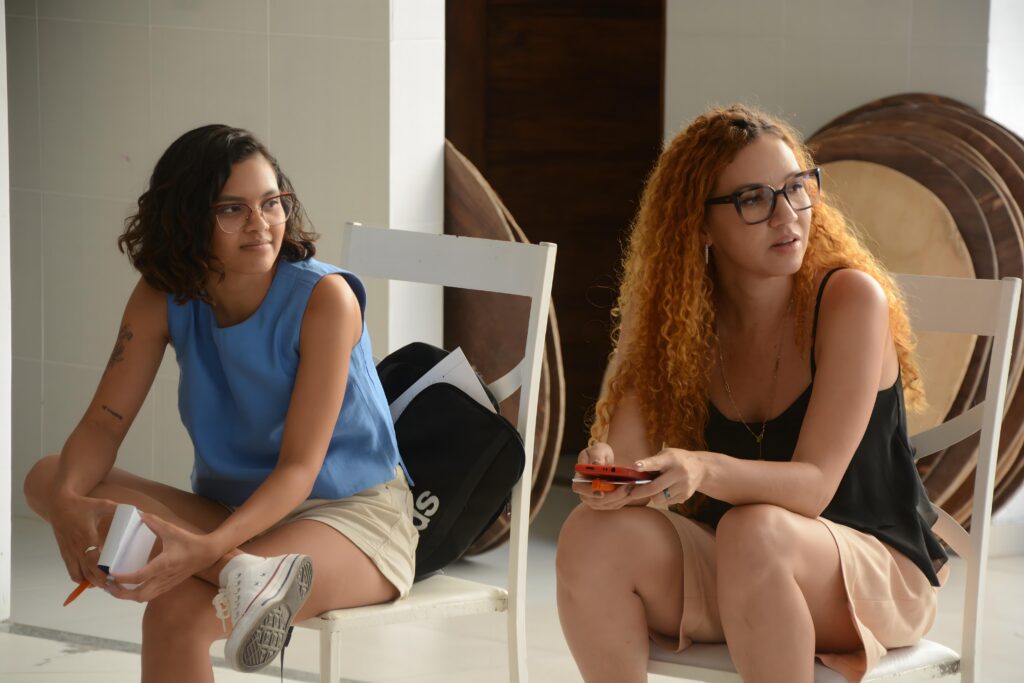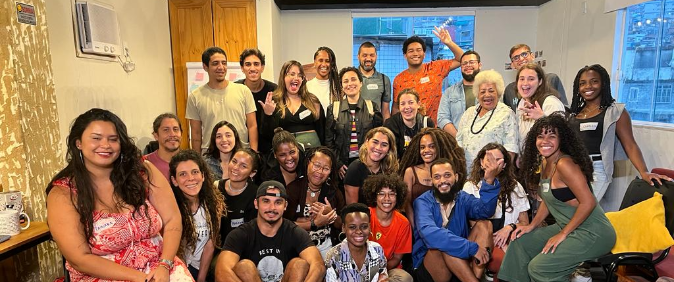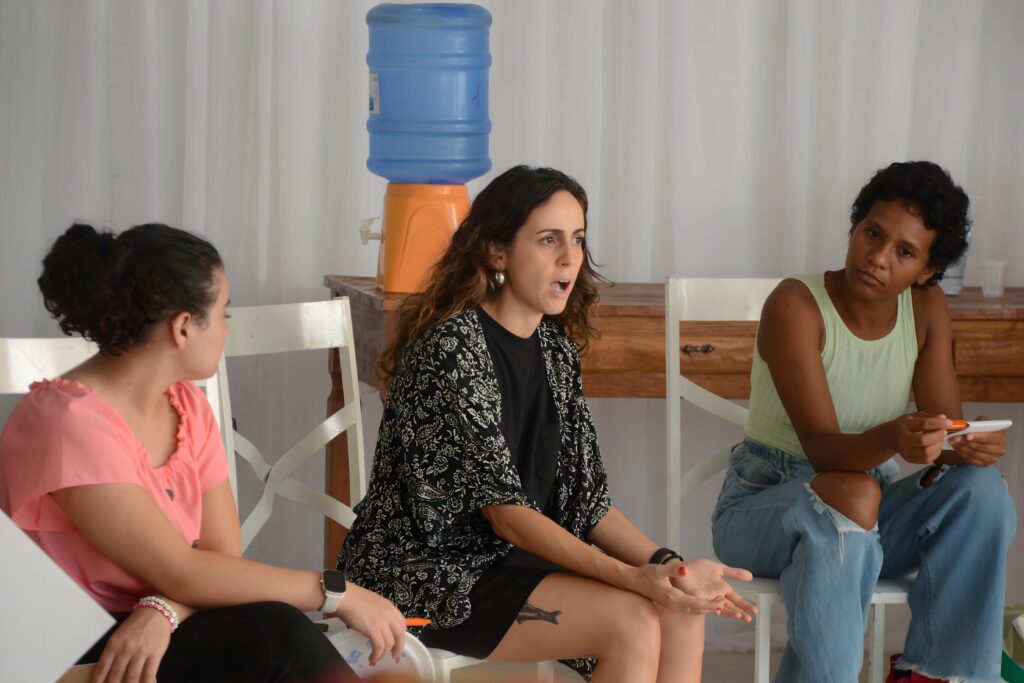Raquel Lemos, co-founder of the digital media outlet Coreto, thinks there’s a lot of hype around local journalism. Still, she considers that recent debates about the importance of local media outlets and efforts to strengthen them rarely include media like the one she founded, which covers the Brazilian city of Poções, in Bahia, where she was born and raised.
“When we talk about ‘strategies for local coverage,’ it is a strategy for local coverage in Rocinha [favela in Rio de Janeiro] or in Salvador [capital of Bahia]. It’s always about local journalism in a big place,” she told LatAm Journalism Review (LJR).
Poçôes, which has 50,000 inhabitants and is 280 miles away from Salvador, is not a large place. This is also why Coreto, which describes itself as “a hyperlocal journalism outlet,” is among the ten initiatives included in the Caravana project, from the Brazilian Association of Investigative Journalism (Abraji).
Since October 2023, Caravana has offered specialized training for organizations dedicated to communication, with courses on journalism and topics relevant to the reality of each community served. To date, according to Abraji, more than 100 journalists and communicators have participated in training as part of the project.
Nina Weingrill, project coordinator, told LJR that Caravana was designed to “capillarize the reach” of Abraji. The idea is to reach journalists and communicators who do not have much contact with the association, but have demands related to its activities and can benefit from the tools and opportunities it offers.
The proposal was to build training paths with each organization that combined their needs with what Abraji can offer, creating “a thread between these two universes and being respectful of the demands that come with each territory,” Weingrill said.
The training offered is internal, with online meetings held every month and a half with the organizations' teams around general journalism topics, and external, with face-to-face meetings that involve participation of the community and organizations' networks in the territories they cover. In-person events, which can last two or three days, are carried out using resources offered by Caravana for this purpose.
The project also offers a financial resource, worth R$8,000 (about US$1,500), for organizations to invest in their own institutional development as they deem most appropriate.
Five face-to-face meetings have already been held: with Associação Fala Roça, from Rio de Janeiro, in November 2023; with the website Coreto, in Poções and in Vitória da Conquista, in Bahia, in December, with the popular communication collective Magnífica Mundi, in Corumbá de Goiás in March 2024; in Chapecó, Santa Catarina, during the 1st Santa Catarina Communication Forum, held by Kombi Livros, in April; and in Porto Alegre, Rio Grande do Sul, at the Anti-Racist Communication Talking Circuit with TV Restinga.
In the second half of 2024, face-to-face training will be held with Abaré Escola de Jornalismo, from Amazonas; the Associação Gira Mundo and the Coletivo Utopia Negra Amapaense, from Amapá; Associação MATPHA, from Acre; and Telas em Rede, from Pará.
Weingrill said that, in the selection, the team responsible for Caravana favored organizations led by people of color, those with a gender perspective and those present in the North and Northeast. It also sought those distant from the capitals, she said.
“The relationship of these organizations with the territory and with the networks within that territory was an important criterion. And also that they work on communication and journalism with the distribution of information for citizens and access to rights,” Weingrill said.
Even before completing journalism school, Lemos and her colleague Leila Costa were already planning to start a journalistic outlet that would provide quality coverage of Poções and its surroundings. They launched Coreto in 2022, with the support of the Accelerating Digital Transformation program, carried out by Meta, owner of Facebook and WhatsApp, and by Abraji in partnership with the International Center for Journalists (ICFJ).
According to Lemos, although there were radio stations and blogs in Poções, there was no “actual journalistic coverage” in the city.
“There was no news coverage, because blogs didn’t publish news. They would publish a headline and a paragraph about a topic, and usually the topic was police coverage. They got the information from the police and there was no investigation or dialogue with other sources,” she said.

Raquel Lemos and Leila Costa, cofounders of Coreto, during the event they hosted with the Caravana project. (Photo: Leonel Brito/Coreto)
Therefore, when they launched Coreto, they sought to “educate the community to consume journalism”, Lemos said. They published videos explaining what some journalistic genres are – news, reporting, opinion journalism, editorial – and the differences between them.
In 2024, Coreto intends to carry out – for the first time in Poções, according to Lemos – journalistic coverage of the municipal elections, which take place in October. To do this, it seemed necessary to carry out “prior media education” with the population about what electoral coverage is and also to “build bridges with strategic people in the community” to have support for the coverage, she said.
Coreto has a media education center that holds workshops in state schools with high school students. With Caravana, they decided to hold a two-day event, open to the general public, that would be a “brief edition” of this workshop, Lemos said.
The event's theme was local journalism and community participation in election coverage. Local communicators, journalism students and community members participated. The training sessions focused on concepts of journalism, physical and digital security during reporting and use of the Access to Information Law, in addition to a session on the formation of the city and the political environment of Poções.
According to Lemos, the meeting brought the community closer to the Coreto team, and also allowed the site's team to understand how they can work with these people to cover the elections. At the moment, the six people who make up Coreto – the two co-founders and four interns – are volunteers and have other paid jobs to support themselves.
“In addition to being few in number, we have little time,” she said. “We can’t be in the neighborhoods to know what’s happening there, so we want these people to tell us, as if they were our ‘correspondents’ in these neighborhoods. With Caravana, we were able to identify the people we can bring on to participate in this coverage with us.”
The meeting also allowed the community to understand that “journalism is not easy,” Lemos said.
“They understood the complexity we face when doing what we do without resources, without structure. It was an exchange. We were able to show them that [Coreto] is not just a space for visibility, it's not just 'we decided to start a news website.’ And we can see that we cannot create a stigma towards our audience. It’s not because people aren’t literate that they don’t have knowledge of the community,” she said.
With 72,154 inhabitants and the highest concentration of residents per square kilometer in Brazil, Rocinha is truly a “big place”: it is the largest favela in the city of Rio de Janeiro and the second largest in the country. Associação de Comunicação Fala Roça, which was born as a print newspaper in 2012, is dedicated to hyperlocal journalism in Rocinha and provides communication services to finance part of its activities.
“Fala Roça is not just a newspaper,” Michel Silva, co-founder and editor in chief of the publication, told LJR. “It is an organization that wants to use knowledge as a tool in the development of the favela. We work on Rocinha issues to involve residents in communication in general.
Silva said that the organization holds a monthly meeting with favela residents called “Desenrola Rocinha” (Rocinha Unfolds). In these meetings, the Fala Roça team and residents debate a problem present in the community and jointly develop possible solutions, which are then published as an article on the association's website.

Caravana project at Fala Roça, in October 2023. (Photo: Fala Roça)
In partnership with Caravana, Fala Roça decided to hold a special edition of this meeting aimed at communicators from the favela. There were classes on the use of the access to information law, fundamentals of journalistic practices and communicator safety, among other topics. And also a history lesson on Rocinha.
“You can’t do journalism without understanding the history of the territory,” Silva said. “To do journalism in Rocinha, you have to understand the history and complexities of Rocinha to be able to address certain topics. This is a very big problem that we identify in the mainstream press, which comes to the favela and produces an article, but sometimes it is a very shallow report, which does not encompass the complexities of the territory.”
Silva said he was surprised by the fact that most people present at the training did not know about the access to information law.
“At Fala Roça, we have a very strong culture of using the access to information law in our reporting. So offering this training is essential to show that the data is public and also how to request the information, as there is a way to ask, you can’t just do it any way you want,” Silva said.
According to him, the communicators who participated in the training supported by Caravana are now part of Fala Roça's network of freelance collaborators and many have already published articles in the print newspaper or on the site.
“From this Desenrola meeting, we nurtured a base of people who can contribute to Fala Roça journalistically, and this is linked to the issue of community building as well,” Silva said.
From exchanges with organizations and being present in local communities, the Caravana team understood that resources taken for granted in certain urban centers are not always available in “small places.” This is the case of the access to information law, which regulates access to public data with municipal, state and federal bodies and entities and which celebrated 12 years in force in Brazil on May 16.
In Poções, for example, “there is no formalization of the access to information law,” Lemos said.
“There is no such thing as sending an email to the city hall following a step-by-step process. You have to speak on WhatsApp with someone you know who is inside the city hall. (...) It doesn't work in our reality. We've tried, but it doesn't work. We have to send it via WhatsApp, we have to meet the person at the bar and talk to them,” Lemos said.

Nina Weingrill (center) during project Caravana's event with Coreto. (Photo: Leonel Brito/Coreto)
The Caravana team understood that this is the reality in most municipalities in the country, and that is why they are creating a guide for helping communicators and journalists implement the access to information law at the municipal level, Weingrill said. She emphasized that this is one of the impacts of work in local communities.
“We are having to rethink and understand what guidelines we need to build, because this is the reality in most of the places we are going,” she said.
The Caravana coordinator said that the power of the project lies in supporting organizations in building a “local sustainability network.” If the community understands how local journalism is done and its value, the chances increase that it will defend it and support organizations in their work, including financially. The meetings also enable the population to understand their rights and how they can claim them.
“[The organizations] are training other journalists and communicators, but they are also training the community itself to demand rights, understand what information it has the right to access, how public authorities should be monitored, what is in fact a right,” she said “So this resource, which is small, ends up being very important to begin a process of mobilization within the local community.”